 I got this book at ABC Books at the first (I think) of the writers’ group group signings I went to in November 2022. I don’t mind telling you that those are the expensive book signings, as I buy one or more books from all of the authors present. Plus often other books. So I definitely prefer the single author signings.
I got this book at ABC Books at the first (I think) of the writers’ group group signings I went to in November 2022. I don’t mind telling you that those are the expensive book signings, as I buy one or more books from all of the authors present. Plus often other books. So I definitely prefer the single author signings.
This book has a healthy display at ABC Books, or has in the past–I’ve often seen it and thought about picking up a copy, and eventually I did. I thought it would be about the author’s dog or a novel about a dog, but it’s actually about a real dog who amazed parts of Missouri with his intellect. Not tricks; the owner would tell the dog to find the man with the red hair, and the dog would; the owner could spell out words in the request, and the dog seemingly understood; and if asked in French to go to the Ford automobile, the dog would. He was examined and tested by members of the University of Missouri staff, and they could not determine how he might be doing it. They never mention whether the dog could do it without the owner present, which would have certainly ruled out responding to cues from the owner, but perhaps they didn’t think of that, or perhaps that was the trick and not part of the legend.
Jim the Wonder Dog is still the pride of Marshall, Missouri, with a Web Site which includes a shop where you can buy this book, a museum, and a park with a statue of Jim.
It’s a short book–60 pages plus end matter including photos and references. To be honest, it kind of inspires me to write similar, short form popular history books on a single subject. Heaven knows when I wrote my piece for History magazine fifteen years ago (!), I thought I could mine the compendia that I read (or read) for tidbits, research them, write about them, and make a living at it. Of course, I was still thinking in print in those days–today, I would be thinking I would do short videos or podcasts on them and make a living at it, but somehow the video form seems cheap and easy and ultimately uninformative, but perhaps I’m just tangentally exposed to what my kids watch. Still, it might have inspired me to try my hand at it.
The book has copious sources listed for each chapter of the book, and it helped clear up something for me. I thought I had just read about Jim the Wonder Dog somewhere, and the probable source appeared: Rural Missouri magazine, which my electrical co-op sends to me every month, had two “recent” articles on him noted in this book: one in 2010 and one in 2014. So it’s possible I read one or both of those articles and thought I read them recently; it’s possible that I did read one of those articles recently because I pulled the old magazine out of the depths of the old magazine drawer (some of whose back issues arrived new around the turn of the century to my home in Casinoport or Old Trees before being moved to Nogglestead); it’s also possible that Rural Missouri, keeping with its schedule, published a more recent article on Jim the Wonder Dog which I read in a more timely fashion. Instead of speculating, I did a little research, and an article entitled Pawprints on Our Hearts indicates the magazine had a story on Jim the Wonder Dog in the May 2020 issue. So I could have read the articles when they first came out, in reprint, and recently.
So a nice little book. Suitable for young readers, but it’s not really a kids’ book. Or maybe it is and it’s just suitable for older readers, too, but that thinking leads to Harry Potter, which I am trying to avoid.





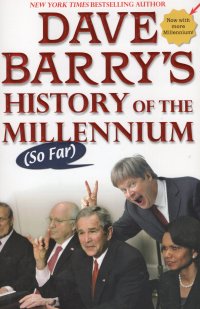 As you know, gentle reader, the year is winding down, and I tend to cut my annual reading list off the week after Christmas sometime. So I thought that this book, which I purchased
As you know, gentle reader, the year is winding down, and I tend to cut my annual reading list off the week after Christmas sometime. So I thought that this book, which I purchased 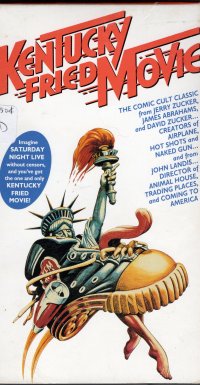 After reading
After reading  Gentle reader, I did start the action film portion of Christmas movie watching by watching Invasion U.S.A. As I did a DVD review such as I do
Gentle reader, I did start the action film portion of Christmas movie watching by watching Invasion U.S.A. As I did a DVD review such as I do  I picked this book up right after
I picked this book up right after 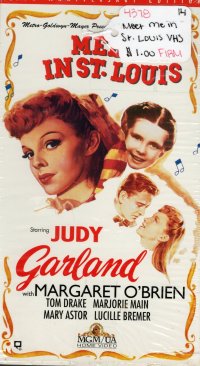 I forget where I recently read that this film introduced the song “Have Yourself A Merry Little Christmas” (perhaps it was not on a blog, but on the front of the box). So I decided to pop in this film which I bought
I forget where I recently read that this film introduced the song “Have Yourself A Merry Little Christmas” (perhaps it was not on a blog, but on the front of the box). So I decided to pop in this film which I bought  Well, after watching
Well, after watching 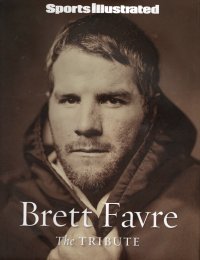 Sports Illustrated must have had this book ready to go, as it was published in that brief period in which Brett Favre had retired as a Green Bay Packer but before he did his little thing and got traded to the New York Jets, for whom he would actually play (unlike his predecessor). Favre announced his retirement on March 4, 2008; the book was published March 31; and Favre started making unretirement motions on July 2. I presume that book sales cratered in summer and autumn. I bought this book as my first ABC Books online order during
Sports Illustrated must have had this book ready to go, as it was published in that brief period in which Brett Favre had retired as a Green Bay Packer but before he did his little thing and got traded to the New York Jets, for whom he would actually play (unlike his predecessor). Favre announced his retirement on March 4, 2008; the book was published March 31; and Favre started making unretirement motions on July 2. I presume that book sales cratered in summer and autumn. I bought this book as my first ABC Books online order during 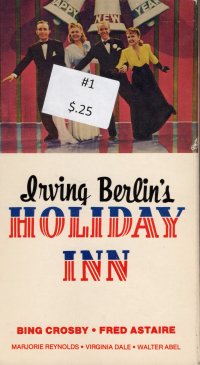 When it comes time to re-watch the movies featuring White Christmas, I must watch them in order: This film and White Christmas. Of the two, I like this one better. I mean, face it: Danny Kaye, the co-star in White Christmas, is no Fred Astaire. Full disclosure: I also own and enjoy A Couple of Song and Dance Men, their 1976 LP.
When it comes time to re-watch the movies featuring White Christmas, I must watch them in order: This film and White Christmas. Of the two, I like this one better. I mean, face it: Danny Kaye, the co-star in White Christmas, is no Fred Astaire. Full disclosure: I also own and enjoy A Couple of Song and Dance Men, their 1976 LP. Gentle reader, after reading the story about it in the
Gentle reader, after reading the story about it in the 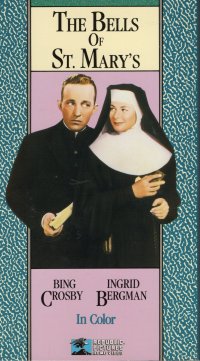 I pulled this film from the Nogglestead media library as a Christmas movie because I remember that it has Bing Crosby introduce his version of “Adeste Fidelis” which is on about 10% of the Christmas records at Nogglestead (or such was the case before I began buying new Christmas record in earnest about a decade ago) and that it has a related children’s Christmas program scene, but as it turns out, the Christmas scene is but one portion of the film. I might as well call
I pulled this film from the Nogglestead media library as a Christmas movie because I remember that it has Bing Crosby introduce his version of “Adeste Fidelis” which is on about 10% of the Christmas records at Nogglestead (or such was the case before I began buying new Christmas record in earnest about a decade ago) and that it has a related children’s Christmas program scene, but as it turns out, the Christmas scene is but one portion of the film. I might as well call  This 2004 film comes from a time where Tim Allen was at the height of his celebrity, returning to the genre where he saw his greatest success in films (the Christmas comedy, as The Santa Clause and its sequels were far better received than, say, Joe Somebody). It’s based on a book by John Grisham who was at about the beginning of the ebb of his bestselling dominance I presume–I can’t think of another book of his after Skipping Christmas, but that might be because not long after I stopped looking at the bestseller list to see how Robert B. Parker’s latest work was doing.
This 2004 film comes from a time where Tim Allen was at the height of his celebrity, returning to the genre where he saw his greatest success in films (the Christmas comedy, as The Santa Clause and its sequels were far better received than, say, Joe Somebody). It’s based on a book by John Grisham who was at about the beginning of the ebb of his bestselling dominance I presume–I can’t think of another book of his after Skipping Christmas, but that might be because not long after I stopped looking at the bestseller list to see how Robert B. Parker’s latest work was doing. As you know, gentle reader, I like to read a Christmas novel around Christmas time, and I generally pick them up at various places throughout the year, maybe one or two a year (I bought this one in Arkansas
As you know, gentle reader, I like to read a Christmas novel around Christmas time, and I generally pick them up at various places throughout the year, maybe one or two a year (I bought this one in Arkansas 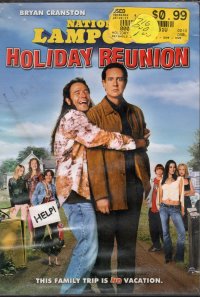 This film is also entitled National Lampoon’s Thanksgiving Reunion which clarifies which holiday is involved, as I discovered when I watched it after Thanksgiving and totally ruined it.
This film is also entitled National Lampoon’s Thanksgiving Reunion which clarifies which holiday is involved, as I discovered when I watched it after Thanksgiving and totally ruined it.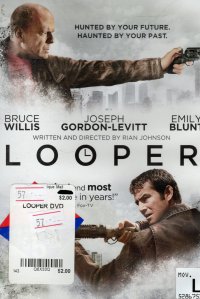 Alright, alright, alright, my film watching has not shifted to Christmas movies exclusively, gentle reader. So I picked up this film one quiet evening at Nogglestead.
Alright, alright, alright, my film watching has not shifted to Christmas movies exclusively, gentle reader. So I picked up this film one quiet evening at Nogglestead. I am not sure that I have seen this film all the way through, but I probably have at some point and might even uncover another copy of it in the library (which happens slightly more for films than for books, fortunately, although the Nogglestead to-read stacks would be less daunting at times if I could like Thanos snap my fingers and half of them disappear–although I’d rather not give my beautiful wife the idea that that is an option). But as it is coming up on Christmas time, I thought I’d watch some Christmas movies, starting with this one.
I am not sure that I have seen this film all the way through, but I probably have at some point and might even uncover another copy of it in the library (which happens slightly more for films than for books, fortunately, although the Nogglestead to-read stacks would be less daunting at times if I could like Thanos snap my fingers and half of them disappear–although I’d rather not give my beautiful wife the idea that that is an option). But as it is coming up on Christmas time, I thought I’d watch some Christmas movies, starting with this one. It did not take me long (relatively) after reading
It did not take me long (relatively) after reading